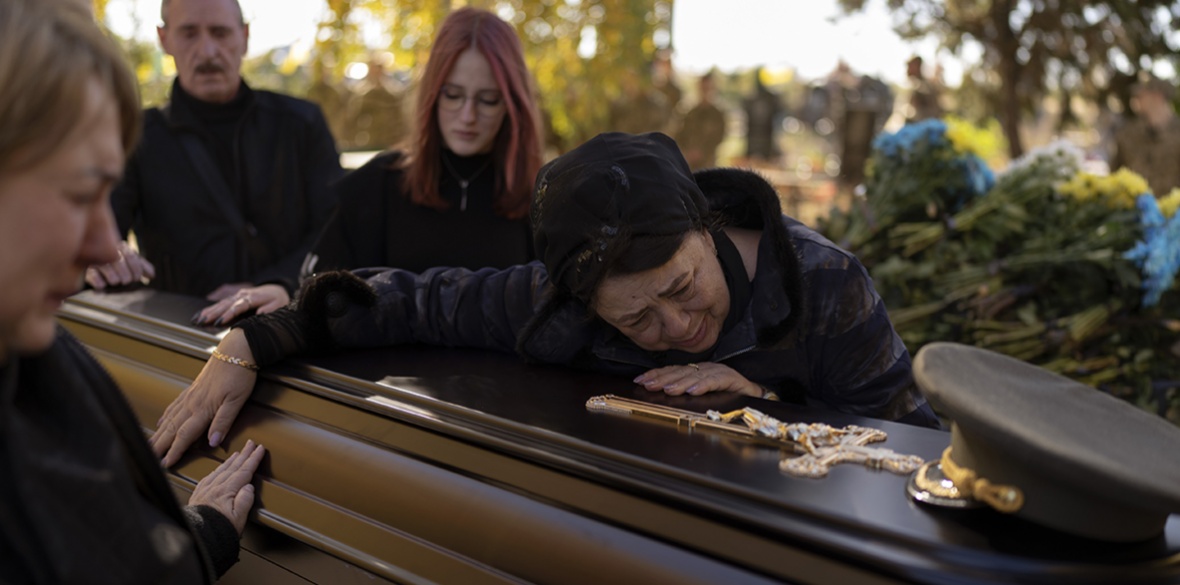This is the last article you can read this month
You can read more article this month
You can read more articles this month
Sorry your limit is up for this month
Reset on:
Please help support the Morning Star by subscribing here
THE unpredictability of war is its only constant. As I write these lines the Russian offensive against Ukraine has stalled.
Armoured divisions lie abandoned and burned out all along the roads to Kiev. Frightened and unwilling conscripts — disproportionately drawn from the eastern regions of the Russian Federation — are being funnelled into a war of attrition and slaughter, poorly trained and increasingly badly armed — in the pursuit of war aims that have all but withered away in the face of Ukrainian resistance.
Vladimir Putin’s dreams of conquest — of taking Kiev in time for a May Day victory parade — have dwindled to a brutal, and consciously brutalising, resolve to fight a war of attrition in order to hold modest territorial gains adjoining the Donbas and to preserve the gains won, in the Crimea, in 2014.
The response of the British labour movement to this aggression should be unequivocal in its support of its sisters and brothers in the Ukrainian trade unions who have appealed for — and are deserving of — our solidarity through both words and deeds.
This means the provision of humanitarian aid and military materiel necessary for the defence, and reconstruction, of a sovereign nation that has been invaded by a larger neighbour.
It means holding our own government to account on behalf of those Ukrainian people whose sanctuary has been delayed, or denied, by the Tories’ dysfunctional approach to settlement schemes.
And, it means the withdrawal of Russian forces from the occupied territories and the rebuilding of Ukraine’s brittle democracy around a framework of social justice that is based upon labour rights and dialogue with the Ukrainian trade unions.
Recently, I had the privilege of meeting Ivanna Khrapko, the youth chair of the Ukrainian Federation of Trade Unions, who told me, in the starkest terms, of the human cost of the war: of the effects of indiscriminate Russian bombing on residential areas, factories and farms.
She spoke of the destruction of the country’s infrastructure, of the unions’ attempts to reunite families, and of their work in securing supplies of warm clothing as the advancing cold of winter threatens the lives of both the young and the old. Her voice cannot be silenced through indifference or hardened cynicism.
The British unions will not be complicit in this and have not been complicit in the economic system — involving the laundering of immense amounts of Russia’s natural resource wealth through the City of London, the British Virgin Isles and Panama — centring around the oligarchs, Gazprom, and Bank Rossiya.
For far too long, the oligarchs’ dirty money — stolen from the Russian people — has polluted the City of London and polluted our politics. The kleptocratic system, begun under Boris Yeltsin and literally fuelled by Putin through oil revenues and the awarding of government construction contracts, has hollowed out the nation state and resulted in a kleptocratic war.
It is also a neoliberal war, whereby the Russian armed forces have seen their supply chains eaten away by corruption and their operations, increasingly, supplemented by the use of private military companies — linked to the Kremlin — who are recruiting and deploying mercenary bands in Ukraine.
The recent appointment of General Sergei Surovikin, whose blood-stained career has taken him from Chechnya to Syria, marks a further step in the cruel vitiation of the war.
To attempt to link his name to the legacy of Marshal Georgy Zhukov, or to link the achievements of the Soviet peoples in the Great Patriotic War to the attack upon — and attempted annexation of — Ukraine, is simply obscene.
Furthermore, it permits the rewriting of history by those revisionist and nationalist forces who would seek to rehabilitate fascists and anti-semites, of the stamp of Quisling, Vlasov and Bandera, as heroic figures fighting for national independence.
Such arguments centre around perceptions of the role of the nation state. Let us be quite clear: the land grab, launched on February 24 2022 is an imperialist war which pays no regard to international treaties, established borders or the rights of peoples and nations to self-determination.
It is unsurprising, therefore, that at a press conference in 2021, President Putin took the opportunity to lambast Lenin for what he saw as the creation of modern Ukraine, as part of a “dangerous time bomb” that permitted both free association and possible secession from a federation of sovereign states.
Yet it was this free association — the “complete equality of rights for all nations; the right of nations to self-determination” — that has underpinned the progressive left’s thinking from the meetings of the First International in London, in 1865, in response to the tsarist empire’s subjugation of Poland, to the revolutionary EL Voynich’s work as the first to translate Shevchenko into English as an act of protest against an imperialist state.
The arc of history has swung us back upon a similar position in order to confront a revived form of “Great Russian nationalism.”
Yet, this time, the tsar precariously seated in the Kremlin increasingly has less of the aura of Peter the Great about him and more the sense of the decay, graft and defeat of a new Boris Godunov.










